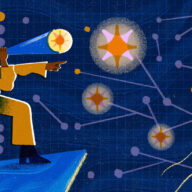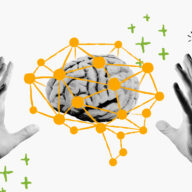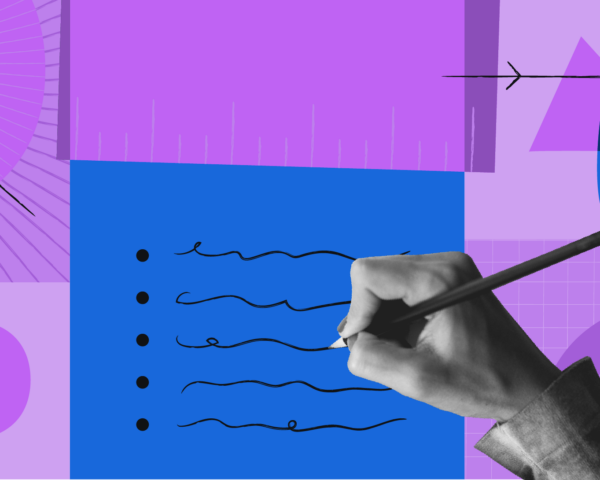5-second summary
- building “soft skills,” such as effective communication and collaboration skills, are vital components of a team’s success.
- making sure everyone is aligned on goals and responsibilities may seem like a no-brainer, but research shows that team members do not always have the clarity that leadership assumes they do.
- using formal procedures to make decisions and solve problems can help ensure that teams don’t get sidetracked by predictable bottlenecks.
teamwork is powerful. tapping into people’s individual strengths and collecting diverse perspectives and ideas helps you get projects across the finish line more efficiently – full stop.
here’s the catch: those perks only pan out if your team works together effectively. and most of us have seen firsthand that successful teamwork doesn’t just happen. leaders are required to make strategic decisions, encourage positive behaviors, and cultivate an environment where people can get their best work done – not just individually, but as a unit.
that all starts with ensuring your team has mastered the most essential teamwork skills.
what are teamwork skills?
teamwork skills are the traits and competencies you tap into when working with other people toward a common goal. knowing how to work well with others isn’t an inherent trait – it’s a malleable skill (and an important one, ranking as one of the most in-demand soft skills employers look for).
when you focus on improving your ability to work on a team, what you’re really doing is strengthening the critical skills that fuel successful teamwork. whether you want to better yourself or help your direct reports master working together as a unit, let’s take a closer look at eight skills to focus on.
1. communication
“we never listen when we are eager to speak.” – francois de la rochefoucauld
a large portion of team or project failures (just take the untimely explosion of nasa’s mars climate orbiter, as one example) arise from miscommunication. so, for teams to work well together, it’s non-negotiable that they know how to share information and get on the same page.
the ability to openly convey a message, align expectations, and offer feedback is essential in the workplace. however, improving communication skills isn’t only about talking – listening plays an equally important role. active listening in particular enhances shared understanding and helps teams avoid crossed wires.
help your team communicate:
- the extroverts on your team are more than willing to jump in with suggestions and opinions, but that can mean steamrolling their colleagues. to make sure everyone’s voice is heard, send an agenda to all participants beforehand so people have time to gather their thoughts. then, be sure to check in with each person during the meeting to make sure they’ve had a chance to speak. for in-depth guidance, run the inclusive meetings play to make sure that everybody’s input is considered when your team meets.
- communication isn’t one size fits all, and your team will be better equipped to communicate information and ideas if they know other people’s communication styles. having each member of the team create a user manual gives them a low-pressure way to share their ideal conditions for getting work done – from their favorite communication channels to how they prefer to receive feedback.
- schedule a regular team stand-up to avoid siloed information your team. this is a short, dedicated huddle where you can discuss team goals, progress, and obstacles to keep everybody in the loop and aligned.
2. collaboration
“alone we can do so little; together we can do so much. – helen keller
collaboration and teamwork are more or less synonyms, so it makes sense that you’d see this skill high on the list. but simply throwing a group of people together and giving them a task doesn’t inherently lead to effective collaboration, no matter how talented those individuals may be.
rather, clarity needs to take priority. team members should understand their unique roles, responsibilities, and deadlines, as well as how their individual tasks impact the project as a whole. that broader focus increases accountability and empowers people to find answers or proactively solve problems themselves.
help your team collaborate:
- who does what shouldn’t be a mystery on your team, however, people may not always have visibility into what tasks their coworkers have to do. try creating a shared document that details everyone’s regular tasks and current projects. you can also run the roles and responsibilities play so there’s no doubt or confusion about what’s on each person’s plate.
- there are certain norms that play out on your team on a daily basis – like muting yourself on zoom when you aren’t talking or using bullet points in emails – despite the fact that they might never be formally discussed. consider creating a shared doc that spells out the “rules of the road” for your team. encourage people to add to it regularly. it’s a great way to help newbies on the team get up to speed quickly. running the working agreements play can help your team iron out a list of those previously unspoken expectations and avoid misunderstandings.
3. goal setting
“if you don’t know where you are going, you will probably end up somewhere else.” – lawrence j. peter
teamwork is all about working your way toward a finish line together – but first, you need to agree on where that finish line actually is. while managers might like to think their goals are obvious and widely accepted, team members may disagree: 72% of employees admit they don’t fully understand their company’s strategy. that’s why this particular teamwork skill is so important.
in order to reap the benefits of effective teamwork, team leaders need to not only explain team- and company-level goals, but also actively involve employees in the process of setting those objectives so that they can take ownership of the outcomes.
how to help your team set goals:
- boost clarity and accountability by setting smart goals, which are specific, measurable, achievable, relevant, and time-bound.
- use a defined goal-setting system like objectives and key results (okrs) or goals, signals, and measures so everybody understands what success looks like.
- make juicy, long-term targets feel more manageable by setting smaller short-term goals along the way.
- store your team goals somewhere centralized and accessible in the workplace (like confluence) so that everybody on the team can refer back to them when needed.
4. decision making
“once you make a decision, the universe conspires to make it happen.” – ralph waldo emerson
teamwork is often at its most frustrating when you feel pressure to make a speedy decision. with so many perspectives to manage, reaching a consensus can be slow. that’s why decision-making is a skill that’s vital in a team environment, especially in collaborative cultures where the manager isn’t always the one with the last word.
to get their best work done, people should be able to listen to other opinions and suggestions with an open mind, then come together collectively to choose the best way forward.
help your team make decisions:
- default to a standard decision-making process to give your team a straightforward framework to rely on as you make choices together.
- sometimes a consensus isn’t possible. in those cases, who has the final say on a project? who’s contributing but not necessarily a key decision-maker? those roles can get murky. use the daci framework so your team knows who fits where and can make more efficient group decisions.
- does your team suffer from major decision delays? try setting a deadline for your team to make a choice. psychology says that while deadlines can be stressful, they also tend to increase focus.
- be mindful of common phenomena that stand in the way of decisiveness, like analysis paralysis and decision fatigue, and take steps to address them when you see them creep in.
5. problem solving
“if i had an hour to solve a problem i’d spend 55 minutes thinking about the problem and five minutes thinking about solutions.” – albert einstein
whether it’s a project that’s running off the rails or a conflict between a couple of colleagues, you and your team are bound to run into your fair share of roadblocks. in those moments, your team’s problem-solving skills are what will carry you through.
successful problem-solving isn’t about slapping on a quick-fix band-aid. some stumbling blocks can be deceptively complex. to truly address and prevent issues, start by digging deep and understanding all of the factors at play using critical thinking skills and problem-solving abilities.
how to help your team solve problems:
- use problem framing to step back and understand the who, what, why, and where of a problem before jumping into solutions.
- the 5 whys analysis is simple on the surface – it essentially involves asking, “why did this happen?” five times in a row. this exercise helps your team uncover the root causes of a problem rather than acting on assumptions and surface-level symptoms.
- the first possible solution to a problem isn’t always the best one, and that’s one of the many benefits of a team: everybody has access to an assortment of ideas and experiences to find the most suitable answer. sparring helps your team get quick, honest feedback from each other in a way that feels structured and approachable.
6. interpersonal skills
“emotions can get in the way or get you on the way.” – mavis mazhura
the thing about teamwork is that you’re working with other people – and everyone has their own feelings, perceptions, experiences, preferences, and more. that’s what makes working as part of a team so enriching (and challenging).
it’s also why interpersonal skills are so critical. they’re the soft skills that you use when working, communicating, and interacting with other people (and plenty of the teamwork skills we’ve already covered also fall under the “interpersonal skills” category). from emotional intelligence to negotiation, these competencies help you work alongside others with less conflict and fewer hiccups.
how to help your team work well together:
- participate in a team personality assessment like johari window so team members can uncover traits they may not see in themselves.
- provide training or other opportunities for team members to build their conflict resolution skills to better handle disputes and disagreements when they come up.
- people can’t always control their emotions, but they can control and improve their reactions and behaviors. unfortunately, emotions can easily become confused with personalities. try to model and encourage people to switch from “i am…” language to “i feel…” language to keep those lines clear. for example, “i am anxious about this deadline” becomes “i feel anxious about this deadline.” it’s a small but significant shift in how your message comes across.
7. time management
time is really the only capital that any human being has, and the only thing he can’t afford to lose.
thomas edison
there’s often a lot to get done and that’s another perk of being part of a team: there are more people to chip in on all of the work that needs doing. but without effective time management skills, teams are setting themselves up for conflict, chaos, and frustration. bottlenecks halt progress, deadlines become suggestions, and the team’s entire plan runs off the rails.
by focusing on improving time management – both individually and as a unit – people can get their work done without the frantic and frustrating dash to the finish line.
how to help your team manage their time:
- use one (or several) tried-and-tested time management strategies to help your team prioritize and focus.
- team collaboration falls apart when people don’t have a grasp on dependencies. for example, team member a might not think missing a deadline by a few days is a big deal – until they realize that it means team member b can’t start their assigned tasks. dependency mapping gives you and your entire team a better sense of how things fit together, so you can proactively manage bottlenecks and other issues.
8. growth mindset
“success is the ability to go from one failure to another with no loss of enthusiasm.” – winston churchill
all teams encounter rough seas from time to time, and a growth mindset is what helps them power through obstacles and find creative solutions.
put simply, a growth mindset is a teamwork skill that frames problems as opportunities – chances to reflect, learn, and improve. a growth mindset helps your team use past experiences to drive better collaborations – and it also means they won’t bristle at perceived failures or criticisms.
how to help your team have a growth mindset:
- run a retrospective regularly or at the end of project milestones so that your team can honestly discuss what worked, what didn’t, why, and how you’ll use that information moving forward.
- prioritize regular and frequent constructive feedback for all team members. these candid conversations help them understand how they can improve themselves – which, in turn, helps them improve the entire team.












































